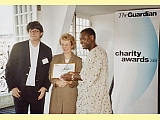
Small charities win top Guardian award for innovation. Smaller charities rarely get the recognition they deserve.
Too busy trying to make ends meet while delivering their crucial services, they have little, if any, time to devote to raising their profile. And working at a mainly local level does not lend itself to securing national coverage.
The five winners of the Guardian Charity Award 2001, for small and medium-sized social welfare charities, are no exception. Each faces an annual struggle to secure funding from a variety of sources while providing invaluable help to disadvantaged groups.
Without the recognition larger charities enjoy, it can be a tough task. But the Guardian award, backed this year by Sainsbury’s, offers a leg up. One of this year’s winners, Iroko Theatre Company, which uses traditional African storytelling, music and dance to enhance children’s confidence, is typical in hoping that the award will strengthen its case for support when it applies to future funders.
Alan Rusbridger, the Guardian editor, who presented the prizes at a ceremony at Shakespeare’s Globe theatre in London, pointed out that past winners had indeed successfully used their £5,000 prizes as seed funding to attract larger pots of money. “It is disproportionally difficult for smaller charities to gain publicity – which is why our awards go for this scale,” he said.
Simon Armson, chief executive of the Samaritans and chair of the judging panel, said of this year’s winners: “We were particularly looking for innovation, and each was able to demonstrate creative thinking and a pioneering spirit, while their projects have the ability to be replicated across the country and reach parts of the community that others cannot reach.”
Iroko and another winner, ClearVision, which produces specially adapted books for visually impaired children to share with their sighted family and friends, already operate nationally. Yet both charities say that many people who could benefit from their service remain unaware of their existence.
For that reason, they will be putting some of their prize money into boosting publicity materials to help spread the word. Iroko will also be producing a pack to help teachers put into practice the lessons from the group’s workshops. “It’s amazing how our African art can engage pupils who are resistant to formal teaching methods,” said Alex Oma-Pius, Iroko’s artistic director.





